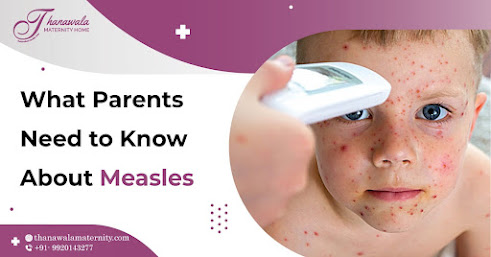Measles, also known as rubeola, is a highly contagious viral infection that primarily affects children but can occur in people of all ages. The measles virus spreads through the air by respiratory droplets produced when an infected person coughs or sneezes. The virus can survive in the air and on surfaces for up to two hours, making it highly contagious. According to a Maternity Hospital in Navi Mumbai, the symptoms of measles typically begin 10-14 days after exposure to the virus.
As a parent, it is important to be aware of the signs and symptoms of measles, how it spreads, and how to prevent it.
1. Signs and symptoms of measles
Measles typically begins with a high fever, cough, runny nose, and red, watery eyes. After a few days, a rash appears on the face and spreads to the rest of the body. Small white spots may also appear inside the mouth. The rash usually lasts 5-6 days and is accompanied by a high fever. If your child develops a rash and fever, it is important to contact your healthcare provider.
2. How measles spreads
Measles is highly contagious and spreads through the air by respiratory droplets produced when an infected person coughs or sneezes. The virus can survive in the air and on surfaces for up to two hours, making it highly contagious. Infected people can spread the virus from 4 days before the rash appears until 4 days after the rash appears.
3. How to prevent measles
The best way to prevent measles is through vaccination. The measles vaccine is safe and effective, and is recommended for all children and adults who have not previously been vaccinated or who have not had the disease. The vaccine is typically given in combination with other vaccines, such as mumps and rubella, and is recommended for children between the ages of 12 and 15 months and again between the ages of 4 and 6 years.
4. Complications of measles
Complications of measles can include pneumonia, encephalitis, and subacute sclerosing panencephalitis (SSPE). Pneumonia is the most common cause of death from measles, and encephalitis can cause seizures, confusion, and in severe cases, permanent brain damage. SSPE is a rare, progressive neurological disorder that can occur years after a person has recovered from measles.
5. Treatment for measles
There is no specific treatment for measles, but supportive care can help manage symptoms and prevent complications. This can include bed rest, fluids, and medications to reduce fever and relieve cough and congestion. If your child develops measles, it is important to contact your healthcare provider for guidance on how to manage symptoms and prevent complications.
In conclusion, measles is a highly contagious viral infection that can cause serious complications. Parents should be aware of the signs and symptoms of measles, how it spreads, and how to prevent it through vaccination. According to one of the best gynaecologist in Navi Mumbai, if your child develops symptoms of measles, it is important to contact your healthcare provider for guidance on how to manage symptoms and prevent complications. By taking steps to prevent measles, we can protect our children and our communities from this serious illness.
Also Check Our blogs at https://thanawalamaternity.com/blog/

Comments
Post a Comment